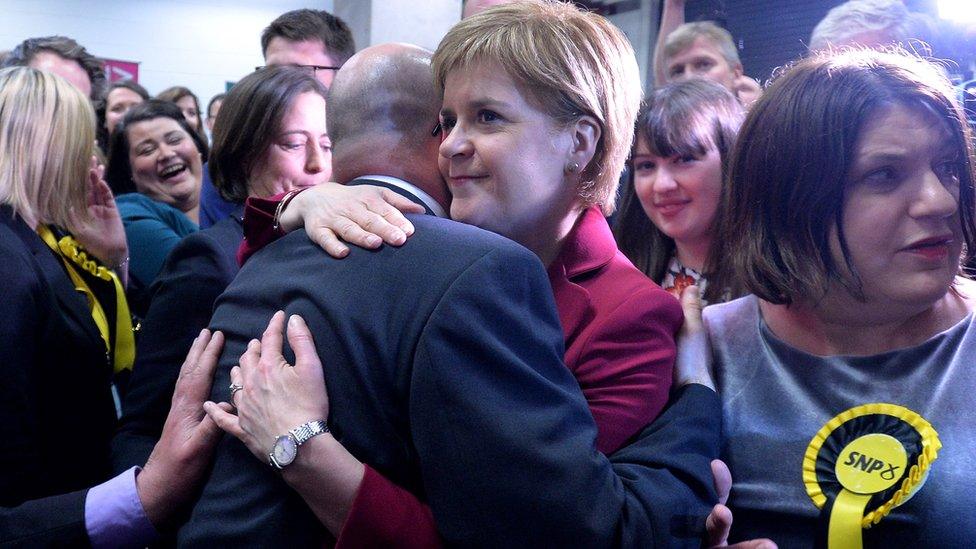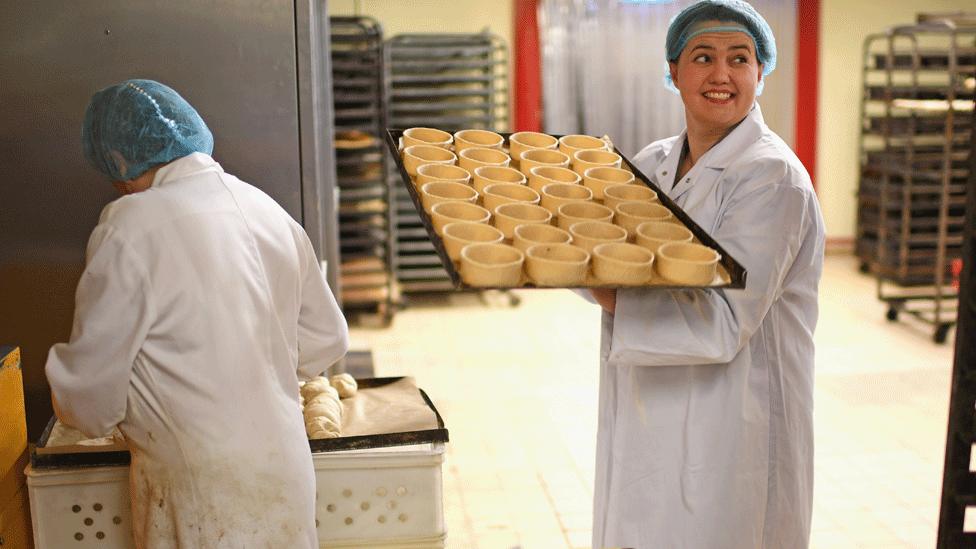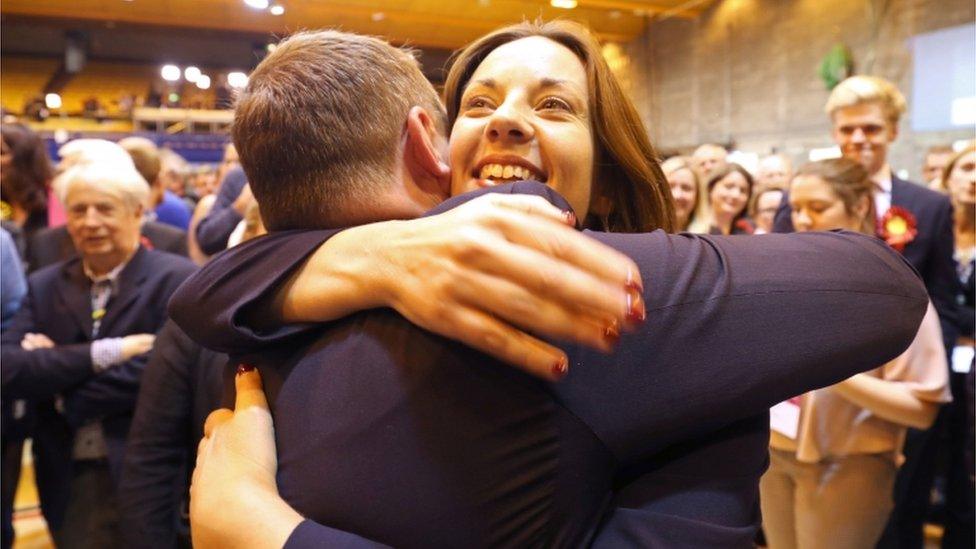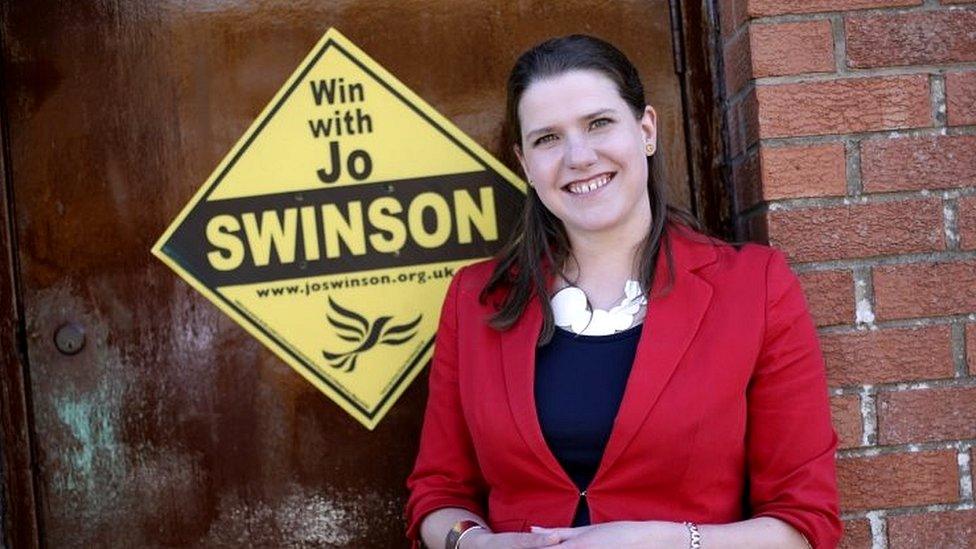How are parties doing one year on from that surprise election?
- Published
Last June's UK election brought in big changes at Westminster - the Conservatives lost their majority and the political colour of Scottish MPs was less yellow and black. So, exactly 12 months on what does the report card of our main parties say?
SNP

Nicola Sturgeon declared victory but there were some painful moments for her SNP
The 2017 general election was a hard one for the SNP. It lost 21 MPs; including Alex Salmond and Westminster leader Angus Robertson. And although not as high-profile, the party's chief whip lost his seat too, meaning the party had to find someone else to get their head around Westminster's often bizarre procedures and manage MPs.
Ian Blackford won the contest to be the new group leader and became the face of the party at PMQs.
It took a while for him to get comfortable at the weekly exchange and inevitable comparisons were made with Mr Robertson, who was widely respected among journalists at Westminster. Mr Blackford has had some successful outings in recent weeks - though some think he's so far failed to make as much of a mark as Mr Robertson did.
He does appear to have found his stride in his campaign for undocumented children to have fees waived when they apply for citizenship. Expect to hear more in the coming weeks.
The SNP has been the biggest party consistently arguing for the UK to stay in both the single market and the customs union after Brexit. And despite the fact that looked very unlikely after the election, the SNP has managed to keep the issue on the agenda.
The party has also been beefing up its credentials in areas like defence. This is with half an eye on a possible future independence vote - it wants any future allies to know it takes defence seriously. But we have also heard a lot about what it wants to happen now; things like shoring up defence in the north of the UK amid increasing hostility with Russia.
Some MPs have fought successful individual campaigns too. Glasgow MP Chris Stephens, for example, helped spearhead a campaign against premium rate phone lines for Universal Credit claimants, which were eventually scrapped. Others like Alison Thewliss have fought hard on other issues like changes to child tax credits (she coined the phrase "Rape Clause").
Strengths
MPs united on Brexit
Stronger on key reserved areas
Success in individual campaigns
Weaknesses
Missing some big hitters
Some disconnect with Edinburgh (for example on whether party had done any work with Cambridge Analytica)

Conservatives

It was a baker's dozen (13) for Ruth Davidson's Conservative Party at last year's general election
The Scottish Tories increased their representation from one to thirteen last June. Scottish Tory leader Ruth Davidson promised her party would fight for Scottish interests and urged the PM to opt for an "Open Brexit".
And her MPs won some early victories in the 2017 Autumn Budget; VAT paid by Police and Fire Scotland was scrapped (the SNP had long-campaigned for this too), there were tax breaks for the oil and gas sector in the north sea, and duty on spirits was frozen. The chancellor said these changes were the result of lobbying by his new Scottish colleagues.
If you follow Scottish MPs on Twitter, you've probably seen the Tories posing with ministers. They certainly appear to have the ear of many.
But, that doesn't always bear fruit. Scottish Tory MPs lobbied hard for the UK to get out of the Common Fisheries Policy during the transition period. But in the end, that wasn't delivered.
The group didn't get what it wanted on the Withdrawal Bill in the Commons either. The Scottish Secretary David Mundell had promised his Scottish Tory colleagues there would be changes to reflect concerns on its impact on devolution before the bill left the Commons. That didn't happen - and some of the Scottish Tories didn't find out the timetable for changes had been scrapped until the BBC reported it. They were less than impressed, though they are now on board with the changes on devolution made in the Lords.
The idea the group was going to work as one on Brexit hasn't materialised. There are a variety of opinions- and many clash with Ms Davidson. Four Scottish Tory MPs backed a letter from the Brexiteer European Research Group calling for a clean break with EU. MP Alister Jack told the BBC at the time that Ms Davidson did not tell them what to do on Brexit. On the other end of the spectrum, there's Paul Masteron who is part of the most remain-inclined group of Tory MPs who want to stay in the single market.
The beefed up Scottish Tory benches do mean the government has some back-up on Scottish issues. Planted questions praising UK government policy (and sometimes attacking Scottish government policy) are fairly regular now.
Strengths
Have the ear of senior ministers
Have won some concessions in Scottish areas
Can support ministers on Scottish issues
Weaknesses
High-profile representations sometimes don't yield results
Divided on Brexit

Labour

The then Scottish Labour leader Kezia Dugdale celebrated her party's improved performance with Edinburgh South MP Ian Murray
Labour increased its Scottish representation from one to seven last year. No longer was Ian Murray the last man standing.
In fact, you don't see much of Mr Murray as a Scottish Labour spokesman anymore. He's effectively been sidelined; Mr Murray is a critic of the party's Brexit position and leader Jeremy Corbyn.
Shadow Scottish Secretary Lesley Laird is the party's new main face at Westminster. She's recently been elected the Scottish Labour deputy leader too, meaning there's an obvious relationship between Edinburgh and London.
Most of the group are supportive of Mr Corbyn's leadership of the party.
And most regularly defend him on Brexit, external (the exceptions being Mr Murray and Martin Whitfield, who both want the UK to stay in the single market).
On the row over Brexit powers, Labour has tried to find a role in the standoff between the Scottish and UK governments. It has urged compromise and transparency in the process, but most of its involvement has been on the sidelines.
There was some confusion over whether the party backed government changes to the Withdrawal Bill. There were briefings at Westminster that Labour wouldn't stand in the way of the amendments, which had been endorsed by the Welsh Labour government. But a few days later Jeremy Corbyn called it a power grab and Labour voted against endorsing the bill at Holyrood.
Strengths
Mostly united behind UK leadership
Work closely with Scottish leadership
Weaknesses
Position on big Brexit powers row not always clear
Some division on Brexit policy

Liberal Democrats

Jo Swinson was back at Westminster after winning the East Dunbartonshire seat she had lost in 2015
Another party who increased their Scottish tally in 2017 - this time from one to four.
That's meant it has a higher profile too, not least with East Dunbartonshire MP Jo Swinson being elected deputy leader of the UK party. She's one of the most vocal feminist MPs.
The Scottish Liberal Democrats continue to trumpet their position as the party that wants to keep Scotland in the UK and the UK in the EU.
Its MPs often campaign hard on local issues too.
But the party is also aware that it has a bit of a hill still to climb to reach the heights of its previous position in Scotland.
Strengths
Higher profile
Strong local campaigns
Weaknesses
Squeezed as fourth Scottish party in Westminster